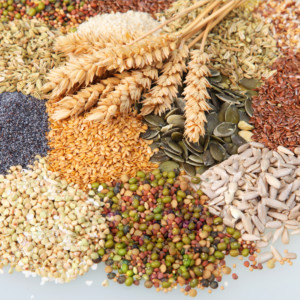Grains – Are they good for you?
 A lot of us know we can’t eat wheat. There are those who have “celiac’s disease” and then there are those who know that wheat and other grains just don’t agree with their digestive system.
A lot of us know we can’t eat wheat. There are those who have “celiac’s disease” and then there are those who know that wheat and other grains just don’t agree with their digestive system.
There are many drugs available for the symptoms that are created by the problems many people have with digestion. And one has to ask the question, are these drugs necessary? Or is it something that I ate?
The question then is asked is wheat and whole grains really the healthy choice that as promoted on ads on TV, radio, magazines and the internet.
Is this true?
Whole grains – this is the type of grain spoken about whenever the problems with wheat and other grains are brought up. While I’m not sure what a half-grain or fraction grain would be – the comparable term for something that is not whole grain, they are referring to grains as compared to processed white flour. We won’t even talk about white flour, there is much to say about how this processing strips the food of minerals and vitamins and is just unhealthy.
So, the question is, are whole grains good for your health?
One of the things talked about is that they are a source of complex carbohydrates? However, even complex carbohydrates are still carbohydrates. What is a carbohydrate? It is glucose molecules linked together. When broken down by digestion, carbohydrates become glucose – sugar.
Hypoglycemia is a common problem and still we hear about the virtues of carbohydrates.
Too many carbs, too much sugar, makes our cells resistant to insulin (called Insulin Resistance). When they become resistant to insulin, the cell does not allow the sugar into the cell where it can be used for energy and the sugar just circulates in the blood. Thus, you get high blood sugar which becomes pre-diabetes which becomes Type II diabetes.
Americans are gobbling up breads, cereals, and pastas and there are even dietary formulas telling us to eat 85% of our total calories.
Optimal health does include carbohydrates. But carbohydrates are found in fruit and vegetables, not only in breads, cereals and processed grains foods. Fruits and vegetables also contain the fiber needed that you so often hear about when talking about processed grain products.
What vitamins and minerals can be found in grain?
Diets based primarily on plant foods (such as grains) tend to be low or deficient in vitamin B12. This nutrient is found exclusively in animal products.
You might here grains referred to as cereal grains. Cereal grains are the seeds the come from grasses such as wheat, millet, rice, barley, oats, rye triticale, sorghum and maize (corn). Common cereal foods include bread, breakfast cereals, pasta and many more processed foods.
Cereal grains are low in fats, including the omega-3 fatty acids needed by the body. Cereal diets lead to inadequate growth because of a reduction of protein and amino acids, compared to meat-supplemented diets.
And grains are low in Vitamin C, D and Zinc, which are very important for your immune system. The Bubonic Plague of the 1300s, came right after a famine that made meat, vegetables and fruit luxury items. The main diet of the time was grains.
See Diet of the Plague (well, at least it wasn’t GMO)
Some problems with grains
Phytic acid is present in the bran of all whole grains and in the coating of nuts and seeds. Phytic acid inhibits the absorption of calcium, magnesium, iron, copper and zinc. This lack of absorption will neutralize our digestive enzymes, resulting in the digestive disorders experienced by many people.
Iron metabolism is affected negatively by a diet high in phytate.
These complex sugars, resulting from the digestion of carbohydrates, are responsible for intestinal gas. There are also indicators linking grain consumption to rheumatic and arthritic conditions.
Our Current Diet
All grains have nutritional deficiencies. Moreover, as we eat more and more grain products in our diet, we tend to eliminate other foods such as meats, fruits, and vegetables. In half the world, bread and grain products provide more than 50 percent of the total caloric intake.
In a month’s time, most of us will have eaten slices of bread, bowls of cereal, pastas of various kinds, bagels, rolls, muffins, crackers, cookies, pastries, corn chips or other forms of chips, and even tortillas.
In actual fact, grains contain undetectable amounts of vitamin C, B12, carotenoids, and other vitamins and minerals, and they tend to displace foods rich in these substances. Moreover, cereal grains may inhibit the metabolism of these nutrients and cause autoimmune reactions.
What should we do about grains?
But really, you could eliminate grains with no harmful effects. The vitamins, minerals, protein, etc. that are in the grain can all be gotten from other foods. The real gluten-free section of your Grocery Store is the Produce Department.
If you have a digestive problem, and even if you don’t, eliminate the grains from your diet for a few weeks and decide how you feel. You might be surprised.
Another thing about grains – one of the problems with grains is fungus. Read Gluten Free, Fungus Free?
For help with digestion, got to Improving Digestion
To Help Your Immunity
STILL HAVE QUESTIONS? EMAIL AND GET YOUR QUESTIONS ANSWERED.
Sign up to receive the MCVitamins Newsletter!
Up-to-date info on the latest health-related news happening in the world
(available in English only)

